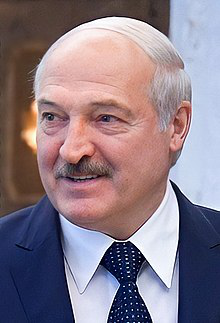

President of Belarus
Alexander Grigoryevich Lukashenko 31 August 1954 Kopys, Byelorussian SSR, Soviet Union
-
Incumbent
President of Belarus "Lukashenko" redirects here. For other uses, see Lukashenko (surname). In this Eastern Slavic naming convention, the patronymic is Grigoryevich and the family name is Lukashenko. Alexander Grigoryevich Lukashenko or Alyaksand(a)r Ryhoravich Lukashenka (born 31 August 1954) is a Belarusian politician who has served as the 1st president of Belarus since the establishment of the office on 20 July 1994. Before his political career, Lukashenko worked as director of a state farm (sovkhoz), and served in the Soviet Border Troops and in the Soviet Army. Lukashenko continued state ownership of key industries in Belarus after the dissolution of the Soviet Union and retained important Soviet-era symbolism, which can be seen in the coat of arms and national flag of Belarus, adopted following a controversial 1995 referendum, which were based on the symbols of the Byelorussian SSR. Following the same referendum, Lukashenko was given more power with the ability to dismiss the Supreme Soviet of Belarus and another referendum in 1996 allowed Lukashenko to further consolidate power. The Russian language was also given the same status as Belarusian, and economic ties with Russia were strengthened, which furthermore led to the creation of the Union State with Russia, which allows Belarusians to freely travel to, work, and study in Russia, and vice versa. However, relations with Russia have not always run smoothly under his tenure, such as during the Milk Wars. Lukashenko heads an authoritarian government and has often been referred to by media outlets as "Europe's last dictator". Elections are not considered to be free and fair by international monitors, opponents of the regime are repressed, and the media is not free, leading to sanctions on Lukashenko and other Belarusian officials being imposed. His disputed victory in the country's 2020 presidential election led to widespread allegations of vote rigging, which strongly amplified anti-government protests, the largest during his rule. Protesters have faced violent persecution by the authorities. A statement by the United Nations Human Rights Office on 1 September cited more than 450 documented cases of torture and ill-treatment of detainees, as well as reports of sexual abuse and rape. Following the contested election, Lukashenko is not recognized by the United Kingdom, the European Union, or the United States as the legitimate president of Belarus. However, Lukashenko is recognized by a number of states including Russia, China, Iran, Armenia, Syria, Venezuela, and Cuba.

We use cookies
We use cookies and other tracking technologies to improve your browsing experience on our website, to show you personalized content and targeted ads, to analyze our website traffic, and to understand where our visitors are coming from. Privacy Policy.